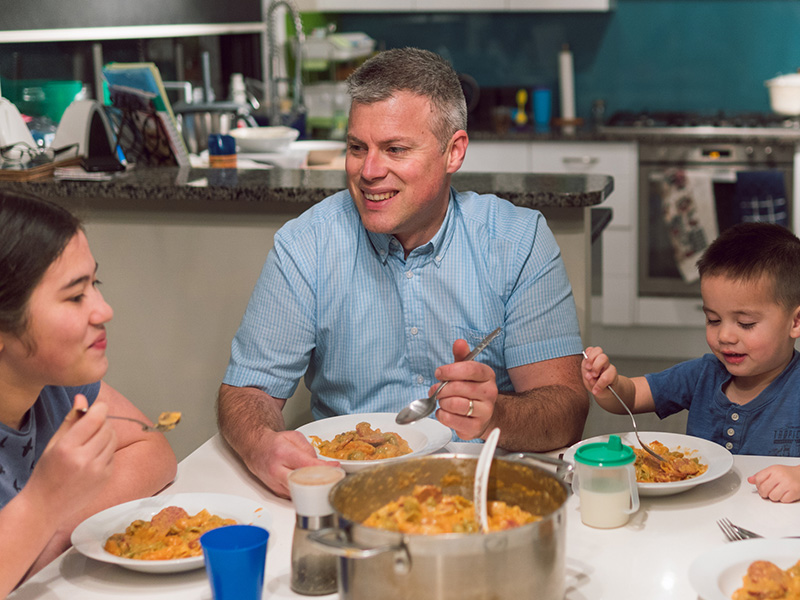
Providing Food for Your Homestay Guests
This page contains information to make it easier for you to have a happy, healthy and well-fed guest.
Please do not hesitate to get in touch with your local office if you run into any issues about food or other aspects of a homestay placement.
Skip to: Tips | Common Issues & Answers | FAQs
Each guest will have chosen a meal package when applying for homestay. The placement report you receive will detail your guest’s selected meal plan. Any specific dietary requirements will be discussed with you prior to accepting a placement. If you don’t know what food you are required to provide, please contact your local office immediately.
NZH offers the following meal packages:
- Complete Homestay: Host provides 3 meals, 7 days / week
- Traditional Homestay: Host provides breakfast and dinner, Mon-Fri, 3 meals Sat-Sun
- Dinner-Only Homestay: Host provides dinner only 7 days / week
- No-Meals Homestay: No meals provided by the host
Please note that available packages will vary depending on your location.
A list of foods deemed adequate for each meal can be found below:
Breakfast: Cereal and milk, toast and spreads, fruit, juice, tea and coffee are a great start. Some Asian students may also request noodles or rice for breakfast.
Hosts can have a hot breakfast such as eggs / bacon etc. available for guests if they wish. It is not a requirement however.
Lunch: Guests will require a meal equivalent to a lunch size portion. This can be leftovers from the previous night’s dinner and a piece of fruit. Sandwiches are also an option with fillings of meat, lettuce, cheese, tomato, salad etc. Please be aware though, most Asian students may not eat sandwiches as they are not used to them.
Dinner: A well balanced, dinner sized meal should be prepared for your guests. Meals need to include meat or other protein, some vegetables and pasta, rice or noodles. Dessert should be offered if others in the home are having dessert at the table.
Snacks: Offer guests a basic fruit bowl with options like oranges/apple/bananas. Hosts should allow for up to two pieces of fruit per day.
Confectionery, muesli bars, crackers, soft drinks and other snack foods are not included in homestay fees and it is up to you if you wish to provide these types of snacks. We advise guests they will need to purchase these at their expense.

TIP #1
After your guest has arrived and had time to settle in, sit down with them to go through your house rules and discuss the meal package they have chosen, what meals you will be providing them, and approximate mealtimes. Ask them what they usually like to eat for breakfast / lunch / dinner (depending on the package they’re on) and if there is anything they don’t like to eat.
NOTE: Some hosts contact their guests before they are due to arrive so everyone can start getting to know each other. This is also an opportunity to ask about the foods they like to eat etc. and even prepare a sample meal plan to gauge what kind of dishes the guest would be comfortable eating.
TIP #2
Take your guests with you, or talk to them before you go shopping, to find out what foods they do or do not like. This will make meal planning easier.
TIP #3
Please ensure you keep adequate grocery items in the cupboard for meals such as breakfast and/or lunch, that guests are required to prepare by themselves. Hosts should prepare dinner for guests.

TIP #4
Take some time to show your guests what to do when preparing meals. Some guests will not be accustomed to making their own meals and many will not be familiar with foods eaten in New Zealand.
Food – Common Issues and Answers
We don’t expect you to make major dietary changes because you’re hosting a student, but you will want to know something about your guest’s food preferences. Always find out what your guest likes and doesn’t like. There are several ways to find out what they are:
- Ask your guest to go to the grocery store with you and point out things he or she likes.
- Ask him or her, “What do you usually eat at home for breakfast?”.
Consider their ‘normal’ behaviours as if they were at home. Toast and sandwiches aren’t normal for some guests. Some prefer leftover rice and a salad for breakfast instead of cereal or an egg and toast.
Just as some of us are more adventurous than others in our eating habits, so are students. Some are hesitant to try new foods. One homestay guest refused to eat spinach noodles at first because she thought they were made of grass.
The customs of other countries may make it difficult for a student to adjust to getting food out of your cupboard or refrigerator, but it’s important to let your guest know what’s available. Except where a family member or guest has dietary restrictions, whatever food is available to the family should also be available for your guests.
It’s very important to respect dietary restrictions based on religious beliefs and practices. These will have been mentioned to your before confirming the placement but it’s a good idea to ask your guest if there are foods he or she cannot eat because of religious beliefs. For example, Muslims do not eat pork, most Seventh-day Adventists don’t eat beef or pork or anything with alcohol in it, and some Buddhists are vegetarians. Usually the limitations are easy to work around in planning your menus. For example, if you are serving pork chops for dinner, you can easily prepare a mince patty for a guest who doesn’t eat pork.
Ask your guest to cook for you. Most students like to prepare a meal that would be typical in their country. The guest would enjoy shopping with you for the ingredients and teaching you how to prepare some dishes. Of course, the most fun comes from cooking together. Learn how your guest cuts onions, for example. Always ask for recipes. Most guests are delighted to have you ask for and try favourite family recipes from their country. They can translate them if necessary. Their mothers (and sometimes fathers) are pleased, too!
Be sure that your guest is getting enough to eat. The most common food-related problem we hear about from guests is that they are still hungry at the end of a meal or between meals. There are several possible reasons for this:
- Your guest may be used to more variety at each meal; one-dish meals are not an international custom.
- Your guest doesn’t like the food.
- Your guest may be very active and burn a lot of calories, so a salad-and-sandwich dinner doesn’t fill him or her up.
- Your guest doesn’t take seconds when they are offered. In some cultures, it’s impolite to accept food the first time it’s offered or to ask for more. Whatever the reasons might be, it’s really very important to be extra solicitous at mealtime to ensure that your guest isn’t leaving the table hungry.
Ensure there is variety in the meals you provide to guests. Some dishes we might commonly eat – such as casseroles – are strange to many guests as they are used to several dishes of separate veggies, fruit, meat, starch, etc. Rice is a staple in many diets around the world and is eaten at every meal. Most guests prefer short-grain steamed rice.
Some extra points to note:
- Be clear with your guest regarding the family dinner hour.
- Ask your guest to call if they will be late or won’t be coming home for dinner.
- You are not required to cook dinner for your guest if they arrive home late, but you do need to leave food for them to reheat.
Frequently Asked Questions
Check out our Host FAQs for answers to common questions about providing meals for your homestay guests.
